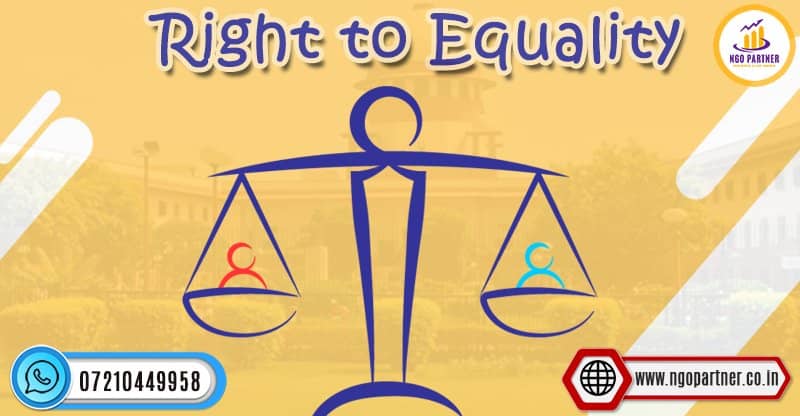
- June 15, 2023
- NGO Partner
- 0 Comments
- 479 Views
- 0 Likes
- Marketing Company Blogs
Right to Equality: Upholding Human Rights and Fostering Social Harmony
Right to Equality
In a world where diversity is celebrated, and fairness is the cornerstone of progress, there exists a fundamental principle that illuminates the path towards a just and inclusive society: the Right to Equality. Like a beacon of hope, this right shines brightly, demanding that every individual be treated with respect, dignity, and fairness.

Equality is more than a lofty ideal; it is a fundamental human right that lies at the heart of our shared values. It embraces the concept that every person, regardless of their background, deserves equal opportunities, protections, and freedoms. It is the belief that no one should be discriminated against based on their race, gender, religion, caste, or any other characteristic.
In the context of human rights, the Right to Equality stands tall, transcending boundaries and cultures. It underpins the principles of justice, social harmony, and progress. It empowers us to challenge prejudice and dismantle the barriers that obstruct the path to a better tomorrow. The journey towards equality is not easy, but it is an endeavor worth pursuing, as it paves the way for a society that celebrates the uniqueness and contributions of every individual.
Join us as we embark on a transformative exploration of the Right to Equality, delving into its significance, key provisions, challenges, and the collective responsibility we hold to foster a world where equality thrives. Together, let us embrace this imperative, as we strive to create a future where everyone can flourish and where equality is not just an aspiration but a lived reality.
Understanding the Right to Equality
In the vast tapestry of the Indian Constitution, there exists a thread that weaves together the dreams of a just and egalitarian society: the Right to Equality. At its core, this right embodies the spirit of fairness and equal treatment for all. It is a testament to the visionary minds who crafted a framework that aims to dismantle discriminatory practices and foster an inclusive nation.
Key Provisions and Scope
As we delve deeper into the labyrinth of constitutional rights, we encounter the pillars that uphold the Right to Equality. Articles 14, 15, 16, and 17 stand as beacons, illuminating the path towards a society free from discrimination. These provisions extend their protective umbrella to all individuals, regardless of their caste, gender, religion, or other characteristics. They create a level playing field, ensuring that no one is left behind or subjected to unfair treatment.
Equality before the Law
One of the cornerstones of the Right to Equality is the principle of equality before the law. This principle establishes that every person, irrespective of their social status, enjoys equal protection and is subject to the same legal processes. It guarantees that justice is blind, unbiased, and impartial. Throughout history, there have been instances where the right to equality has played a pivotal role in correcting injustices, serving as a powerful tool in the hands of those seeking justice and societal transformation.
Prohibition of Discrimination
In the journey towards a truly equal society, the Right to Equality stands tall as a beacon of hope, vowing to eradicate discrimination in all its forms. It fiercely guards against the venomous fangs of bias, shielding individuals from the chains of prejudice. Religion, race, caste, sex, and place of birth—these factors should never be used as ammunition for inequality. Instead, they should be celebrated as the vibrant threads that weave the rich tapestry of humanity.
The path to equality often demands more than just the absence of discrimination; it requires active measures to address historical disadvantages. This is where the transformative power of affirmative action and reservations comes into play. By carving out spaces for marginalized sections of society, these initiatives aim to level the playing field and create opportunities that were once denied. They are the stepping stones towards a more inclusive and just society.
Challenges and Progress
The road to equality is not without its hurdles. Deep-rooted social prejudices and systemic inequalities pose formidable challenges in the quest for true equality. The battle is fought on multiple fronts, from dismantling caste-based discrimination to shattering gender stereotypes. But even in the face of adversity, progress glimmers on the horizon.
Legislative measures and social initiatives have paved the way for positive change. Landmark decisions and policies have challenged the status quo and set in motion a wave of transformation. They have given voice to the voiceless, shattered glass ceilings, and brought long-denied rights within reach. While the struggle continues, each step forward is a testament to the collective efforts of those who believe in the power of equality.
Promoting Equality in Society
Building a society that truly embraces equality requires a concerted effort from all. It starts with awareness—an awakening to the realities of discrimination and its insidious impact. We must foster inclusivity in our homes, schools, workplaces, and communities, nurturing an environment where everyone feels valued, respected, and empowered. Each individual and organization has a role to play in this grand tapestry of equality.
By challenging our own biases, embracing diversity, and advocating for justice, we contribute to the mosaic of change. We can support organizations working towards equality, participate in grassroots movements, and educate ourselves and others on the importance of equality. Together, we can create a society where every individual can thrive, regardless of their background, and where the Right to Equality is not just a constitutional ideal, but a living reality.
In conclusion, the Right to Equality stands as a powerful force in the pursuit of justice and social harmony. We have explored its various dimensions, from understanding its constitutional roots to examining the challenges and progress in its realization. The importance of prohibiting discrimination and promoting affirmative action has been highlighted, along with the need for greater awareness and inclusivity.
As we wrap up this discussion, let us remember that equality is not just a legal principle; it is a moral imperative. We must embrace its values in our everyday lives, challenging discrimination wherever we encounter it. By actively working towards a more just and equitable world, we contribute to the realization of human rights for all. Let us walk this path together, united in our commitment to building a society where every individual is treated with dignity and respect, and where the promise of equality becomes a living reality.




Leave a Comment